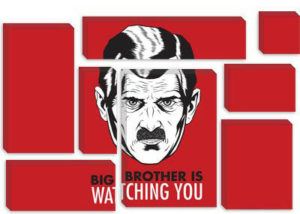Chapter 3: Liberty

Big Data is watching you
Harari’s main thesis in Sapiens and in this book is about stories – what they are, which ones we choose to believe in, and how they shape our world. Liberalism is one of the greatest stories we have invented. Human liberty is its number one value.
According to liberalism, free will causes us to act the way we do and gives rise to political systems – whether authoritarianism or democracy. Liberalism impels us to believe in the sanctity of free markets, and in our personal lives, we would be wise to follow our hearts. If we don’t violate the freedom of others, we are free to do what we want. These are the core tenants of human rights.
But are we free? Consider Harari’s Orwellian discussion of what our television screens are turning into.
The word television comes from Greek ‘tele’, which means ‘far’, and Latin ‘visio’, sight. It was originally conceived as a device that allows us to see from afar. But soon, it might allow us to be seen from afar. As George Orwell envisioned in Nineteen Eighty-Four, the television will watch us while we are watching it. After we’ve finished watching Tarantino’s entire filmography, we may have forgotten most of it. But Netflix, or Amazon, or whoever owns the TV algorithm, will know our personality type, and how to press our emotional buttons. Such data could enable Netflix and Amazon to choose movies for us with uncanny precision, but it could also enable them to make for us the most important decisions in life – such as what to study, where to work, and who to marry.
Moral decisions too, can be determined by algorithms – indeed, they already are. The ethical discussion of how to program an algorithm to operate in real-life situations is already taking place. Autonomous cars, by communicating with each other, will have to make instantaneous choices about which sacrifices have to be made, which passengers’ lives are more expendable – machines, far from being considered incompetent moral agents, are inheriting the responsibility for moral dilemmas that have plagued philosophers and lawmakers for millennia.
For example, suppose two kids chasing a ball jump right in front of a self-driving car. Based on its lightning calculations, the algorithm driving the car concludes that the only way to avoid hitting the two kids is to swerve into the opposite lane, and risk colliding with an oncoming truck. The algorithm calculates that in such a case there is a 70 per cent chance that the owner of the car – who is fast asleep in the back seat – would be killed. What should the algorithm do?16
There is a dystopian vision of the future where AI will take over the world, but people who are afraid of such a future are conflating two things: intelligence and consciousness. Intelligence is about solving problems, consciousness involves feeling pain, love, and anger. Harari isn’t saying that it’s impossible for people to program robots to commit atrocities, but that if these atrocities ever do happen – it won’t be because a certain machine decided it was fed up with the world.
Read 21 Lessons For The 21st Century
If you are interested in reading books about unmasking human nature, consider reading The Dichotomy of the Self, a book that explores the great psychoanalytic and philosophical ideas of our time, and what they can reveal to us about the nature of the self.